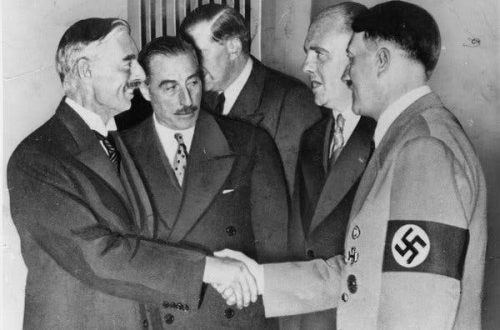Following on from my previous post, Rory Connor from the comments section brought to my attention an exchange of views that occurred in the pages of Spectator in 1988. The exchange was sparked by a December 5, 1987 article by Paul Johnson entitled “When is a Foetus Disposable.” Godwin had not invented his law in 1988, and it was designed for online debates, not exchanges in magazines. However, when the Hitler comparisons and analogies do start flying, it is often time to call a halt to the debate. I visited the vaults, located the exchange in question, and I copy below the relevant points:
“Letters,” The Spectator, January 2, 1988, p22.
Personal Rights
… when severe defects [in the foetus] have unfortunately not been diagnosed until the baby is actually born, why should we simply leave the baby to endure an intolerable life until natural death finally brings relief? In a sense, the euthanasia of a newborn baby can be regarded as a very late abortion – but at that stage the gravest reasons would be required to justify it: in fact, nothing but the baby’s being born with such severe handicaps that he or she could never have anything like a normal life.
It is not the same as the situation of an older child becoming severely disabled, perhaps through an accident. At birth, a baby has very limited awareness, has no idea of any future, and has no real stake in life, whereas an older child (a three-year-old, say) has become a real little person, with a sense of his own identity, with personal relationships, and with an idea of purposes and time – the very things that give human being full status and rights.
Barbara Smoker
President, National Secular Society
“Letters,” The Spectator, January 23, 1988, p2o.
Being and Unbeing
[Barbara Smoker] adumbrated a proposition by which, as far as I could understand, it would have been all right to massacre a newborn baby if it were severely handicapped. There was a hint that it might even be all right until the child was “a three-year-old, say”, when it would have become a “real little person.” After which, I took it, it would not be all right.
…. [I] wonder whether Ms [Smoker] had never noticed that babies of two months, two days or even two minutes had distinct personalities; and…perhaps the thing which gives human beings full status and rights was to be alive….
I read your leader about Asian women aborting girl children, and your apt observation that this was equally as wrong as denying life to people on the grounds of handicap. It struck me for the first time that had I been conceived today, suffering as I do from muscular dystrophy, I would have been detected by modern scanning as unacceptable, and aborted (or, of course, bopped on the head at birth if Ms had had her way).
Now, while there may be those who think that that would have been no bad thing, I prefer to be alive. And I would like, after all, to make the point to Ms and the member of her society.
Quentin Crewe
….[A fertilised egg] contains the complete genetic constitution of an adult, including sex, ultimate dimensions, texture, temperament and intellectual capacity. No one knows whether this microscopic marvel will become a Shakespeare or a Michelangelo. But if, as is likely, it will become an ordinary man or woman, we should approach it with awe and love.
M. A. Lynch
“Letters,” The Spectator, February 20, 1988, p24.
Perfection in the womb
Quentin Crewe…. substitutes for my list of qualities that give human beings their status and rights the one qualification of simply being alive. But that would prevent him from killing to eat, for even vegetables are alive.
He then says that, since he suffers from muscular dystrophy, (for which he has my true sympathy), he might have been aborted and this genetic condition been susceptible to foetal diagnosis before he was born. At the risk of seeming heard-hearted, I must ask: so what? The entity would have been aborted would have known nothing about it, and, of course, would not have been his present self, with his sense of identity, his stake in life, his aspirations, and his personal relationships. In fact, it would never have become a person at all. In that event, he would admittedly not exist now…. And if every woman carrier of muscular dystrophy were to abort all her female foetuses (which would otherwise develop into carriers) and keep only those male foetuses found to be free of the gene, this distressing disease would be eliminated (except for mutants) in a single generation. Similarly with other sex-linked genetic diseases….
[M.A. Lynch pursues] the same fallacious argument as Mr Crewe – treating potential as though it were actuality – and points out that an aborted foetus might have become a Shakespeare or a Michelangelo. (Equally, of course, it might have become a Hitler or a Michael Ryan. And to ensure the development of every potential Shakespeare or Michelangelo, there would have to be total ban on birth control.)….
Barbara Smoker
President, National Secular Society
“Letters,” The Spectator, March 5, 1988, p20.
Acceptable Crime
Barbara Smoker… now says it would have all right to abort me because I would have known nothing about it. Since when has the victim’s knowing nothing of it made a crime acceptable? I could bump off Miss Smoker without her knowing anything about it, but I would hardly think it was right or even desirable, let alone that it should be made legal.
It is interesting that Miss Smoker should be the first to introduce Hitler into this discussion. It was his followers who wanted to perfect the human race by killing the weak and by genetic engineering. I begin to wonder about this society of which Miss Smoker is president.
Quentin Crewe


